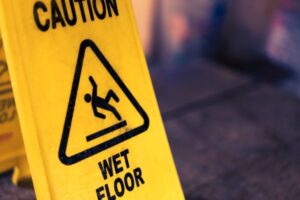Menu
GET A FREE CONSULTATION
863.225.0254
Most people have seen the bright yellow “Caution, Wet Floor” signs placed in grocery store aisles, restaurants, or office lobbies. These signs are designed to warn customers of potential hazards and to help businesses protect themselves from liability. But what happens if you slip, fall, and suffer injuries even though a wet floor sign was present? Does the presence of the sign automatically mean the store cannot be held responsible? The answer is no. The existence of a wet floor sign does not completely shield a business from liability in Florida.
Under Florida premises liability law, property owners and businesses have a duty to maintain safe conditions for customers and visitors. Posting a warning sign is part of fulfilling that duty, but it is not the end of the story. If the store failed to properly clean the hazard, placed the sign incorrectly, or left the dangerous condition unaddressed for too long, they may still be found negligent and liable for your injuries.
The purpose of a wet floor sign is to provide notice of a hazard, but it must be used properly. A sign placed in the wrong location or left out indefinitely may actually raise more questions about the store’s actions. For example, placing a single sign in the corner of an aisle does little to warn someone walking in from the other end. If the store knew of the hazard but did not take reasonable steps to clean it up in a timely manner, then simply putting out a warning sign may not be considered sufficient.
Here are some common situations where a wet floor sign is not enough to prevent liability:
In these scenarios, the sign may not protect the business from being held accountable if someone slips and falls.
Florida law requires injured parties to prove that the business either knew about the dangerous condition or should have known about it through reasonable inspection. A wet floor sign is evidence that the business had knowledge of the hazard. This can actually help the injured customer’s case because it shows the store was aware of the risk yet failed to eliminate it promptly.
For example, if an employee spills liquid while stocking shelves and places a sign nearby but leaves the spill unattended, the store has acknowledged the danger but has not taken reasonable steps to protect customers. The law does not allow businesses to simply warn of hazards and then ignore them. Their duty includes both warning and correcting the unsafe condition within a reasonable time.
Every case depends on the specific facts, such as the size of the spill, how long it had been present, whether the area was monitored, and how the store responded once the hazard was discovered. These details often determine whether the presence of a wet floor sign reduces liability or fails to protect the business at all.
If you slipped and fell where a wet floor sign was present, proving liability may require careful evidence gathering. The following types of evidence can be especially valuable:
Collecting this information quickly is important because businesses may attempt to move or remove signs, clean the spill, or downplay what happened. Working with an attorney ensures evidence is preserved before it disappears.
Slip and fall accidents often result in more than minor bruises. Victims may suffer broken bones, back injuries, concussions, or long-term complications that require extensive treatment. If a business is found liable, victims may be entitled to compensation for medical expenses, lost income, rehabilitation costs, and pain and suffering.
Florida law also allows claims for future damages, which means you can pursue compensation for ongoing medical care or diminished earning capacity caused by your injury. These cases are about more than a temporary inconvenience. They are about protecting your health, your financial stability, and your right to hold negligent businesses accountable.
Slip and fall claims involving wet floor signs can be challenging because businesses often argue that the presence of the sign absolves them of responsibility. Insurance companies may claim that you should have been more careful because a warning was present. Without skilled representation, these arguments can make it difficult to recover fair compensation.
At Kemp Injury Law, we understand the tactics businesses and insurers use to deny or reduce claims. We investigate thoroughly, gathering evidence to show whether the sign was used appropriately and whether the business failed in its duty to provide a safe environment. Our goal is to ensure that your rights are protected and that you receive the compensation you deserve.
If you were injured in a slip and fall accident, even if a wet floor sign was present, contact us today. We will review your case, explain your options, and fight for justice on your behalf.


